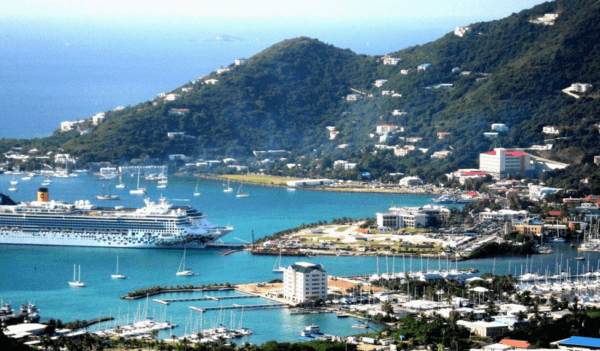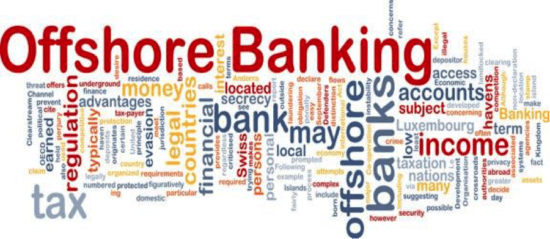
Offshore banking occurs when a person who resides in one country opens a bank account in another country. So, someone who deposits funds or invests with a foreign bank or “offshore bank,” such as a person who lives in the US, UK or Australia who opens an account in Switzerland is engaged in offshore banking. In contrast, a bank located within the country in which you reside is called a domestic bank.
Is Offshore Banking Safe?
The real question is, “Is onshore banks safe?”
According to a recent Global Finance survey that ranked the 50 safest banks in the world, about 40% of them were located in Europe. In fact, the nine safest banks were all located in Europe in spite of the worldwide economic slowdown that has affected many EU nations. The rest were located in Australia, the Middle East, Singapore, China and Japan. Only three of the top 50 were American, all on the bottom half of the list. Again, the US, with 21.7% of the world’s gross domestic product, (source: IMF, 2011), has only 8% of the banks on the top 50 list. The safest bank in the US was number 25 on the list. So, if you are a US person, the real question is, “Is banking in the US safe?”
The theoretical safety net suggested by the FDIC has many holes in it. The FDICs reserve requirement is only 1.35% of insured deposits. For example, if too many insured banks fail and 1.36% of US deposits need rescue, the FDIC will get sucked down the same drain, as a recent Bloomberg article pointed out. Unlike what many think, the Federal Deposit Insurance Corporation is not a government agency. The FDIC is a private corporation. So, it cannot crank up the money presses and print its way out of danger. It can go bankrupt just like any other private company. In 1990 the FDIC reserve fund was $13.2 billion. Not long ago, the Wachovia Bank failure took $8.86 billion from the FDIC. Washington Mutual cost them $3.3 billion. IndyMac cost about $4 billion. Just those three banks total $16.16 billion. Though the reserves have increased since 1990, the expense of those three bank failures is almost $3 billion more than the entire 1990 reserves of the FDIC.
If the FDIC goes bankrupt, that US financial system would likely erupt into panic. Members of the public would quickly pull their money out of US institutions in droves, making it an even more dire situation. Major portions of the US banking system would likely collapse and a large percentage of deposits would vanish into thin air. Think this is far fetched and couldn’t happen in the US? Think again. It has already happened. Back in the 1920’s and 30’s there was a major collapse of the US banking system. Back then when failed banks were shuttered, there was rampant looting of safe deposit boxes and the contents of them were stolen. If the FDIC fails, experts agree that the same thing could happen here in spite of the false notion that, “There have been changes and it could never happen again.”
Some would say that, “FDIC insured deposits are backed by the full faith and credit of the United States Government.” Have you watched the news lately? Should think that the backing of the most in-debt government in the entire world should give us comfort? There comes a point when all of us need to pull our heads out of the proverbial sand. It isn’t safe here anymore.
US Bank Failures Reach All Time High
In 2005 do you know how many banks failed in the United States? Zero (0). 2006? Zero (0). 2007? Three (3) banks failed. Can you guess how many failed in 2008, 2009, 2010 and 2011 combined? A whopping four hundred and fourteen (414) banks failed!
Again, the real question is, is “onshore” banking safe?
| Year | US Bank Failures |
| 2005 | 0 |
| 2006 | 0 |
| 2007 | 3 |
| 2008 | 25 |
| 2009 | 140 |
| 2010 | 157 |
| 2011 | 92 |
| 2013 | 24 |
| 2014 | 18 |
| 2015 | 8 |
| 2016 | 5 |
So, again, is offshore banking safe? According to Global Finance, one of the most trusted organizations that provide bank safety rankings, the answer is “yes, without question,” when you choose the right bank. It is the domestic banks (for people in the US and UK) that you have to question.
What Is the Solution?
Diversify offshore by opening an account in one or more of the world’s safest banks. Be sure to get guidance from an organization that has been actively engaged in offshore banking for many years. Sure, we’re self-promoting a bit, but this organization has been around since 1906 and have provided the service of opening offshore accounts for people for decades.
Offshore banks by and large require you to open your account in a company name, not your personal name. It is to your benefit as well. A Nevis LLC, for example, has some of the most protective statutes on the planet for asset protection purposes. Plus, when you wire funds from your name to a company name, prying eyes cannot instantly know that it is yours. So, holding your account in an offshore company name holds multiple asset protection and financial privacy benefits as well.
In addition to the above, the second solution is to establish an offshore brokerage account and invest the funds as you would in back home. There are very good discount stock brokers offshore as well as extremely experienced money managers with respectable long-term track records.

Major Benefits of Offshore Banking
Offshore banking offers opportunities not available domestically. Banks in Switzerland are known for being strong and safe and, unlike banks in most parts of the world, most have personnel who act like financial planners. The Swiss are master money managers and the banks there apply the right combination of safety and growth.
In addition, offshore banking is private and, when held in the proper legal tools such as an international limited liability company (LLC) such as a Nevis LLC or a Belize LLC or LDC and offshore trust, is soundly shielded from lawsuit attacks. Held offshore in the proper jurisdictions, the opposing attorney cannot obtain a court order to freeze the account. When a foreign trustee is involved, the foreign trustee is not bound by your local court orders. That is why many experts agree that a combination of an offshore trust that owns 100% of an offshore LLC that, in turn, holds an offshore bank account makes for a the most powerful asset protection structure on the planet for liquid assets.
Offshore accounts are generally tax-free in the jurisdiction where the funds are held. So, that only leaves you with whatever taxes are due and payable in your home country. The governments in the US, UK, Canada, and Australia generally tax worldwide income. So, in the most popular offshore banking jurisdictions, there is no extra tax and no there are extra tax forms to complete in the country where the account is held.
In addition, for offshore tax savings, there is a vehicle called an offshore “captive insurance company.” Ninety percent of Fortune 500 companies have one or more captive insurance companies. This is an actual, licensed insurance company that you own. Your local business pays insurance premiums to your own insurance company for real but unlikely risk. Your local business takes a tax deduction as an ordinary and necessary business expense. This vehicle is allowed in many countries including the US under Internal Revenue Code Section 831(b). The offshore insurance company holds an offshore bank account. It is treated as a domestic insurance company under IRC Section 953(d). You get to deduct the first $2.2 million per year in insurance premiums you pay and the captive insurance company receiving the premiums receives the first $2.2 million tax-free. In the following calendar year, another $2.2 million can be contributed, for a total of $4.4 million over two years, $6.6 million in premiums are tax deductible over three years, etc. The funds are generally held in an offshore bank account. This vehicle is to be operated in conjunction with a licensed tax advisor who is experienced with captive insurance companies. The word “knowledgeable” here eliminates 98% of CPAs. So, if you need help finding one, utilize the number or form here so someone can help you.

Can I Save Money in Taxes?
If your country does not tax income generated in foreign countries and you use a bank in a country that allows foreigners to receive tax free banking income, then your offshore income can be tax-free. But if your country does tax foreign income (like US and UK), you should report it. With the US and UK, offshore banking is generally tax-neutral in most instances. So, when talking to people from these regions, this organization usually doesn’t like to mention the words “tax” and “offshore” in the same sentence. But it is a question that often arises, so it is prudent to briefly touch on it here.
If you do want to save money in taxes using offshore banking, there are legal ways to do so. Possibilities may include the proper use of an offshore captive insurance company, owning and controlling less than 10% of an offshore company that holds the offshore account, etc. However, this is a very sensitive area of the law and this company highly, and that means highly, recommends you also work with a knowledgeable, licensed accountant to stay in safe territory. This cannot be emphasized enough that saving money in taxes using offshore vehicles is expressly not a do-it-yourself project. “I shouldn’t have to pay taxes on the money until I bring it back to the US,” sounds good in theory, but it is not part of the US or UK tax codes. Get and maintain an experienced tax advisor when you use offshore financial institutions. Period.

How to Open an Offshore Bank Account
Use the on the number or form listed on this page for help and guidance. This article is more informational than self-promotional, but this company honestly does not know any organization in the world that has aided more individuals in establishing offshore bank accounts, so this is giving you our honest and semi-unbiased recommendation.
What are your needs? Do you want asset protection from lawsuits? Do you need it to operate a business in a particular country? Do you want to save money in taxes? (Be sure to get licensed tax advice on this question.) Do you have legal intent and are in need of financial privacy? Do you feel that offshore banking is safer than holding funds in the country in which you reside? Let us know.

Is Offshore Banking Legal?
Yes. It is perfectly legal to have an offshore bank account. Just be sure to keep experienced legal and tax advice so that you can file the proper forms at the proper time.

Will Offshore Banking Raise a Red Flag With the Tax Authorities?
No. There are billions of dollars moving across the borders on a daily basis. Operated properly, your offshore account will not stand out over any of the others. Having an offshore bank account does not raise a red, green, blue or turquoise flag with the IRS. Not reporting it, however, does. So, report it properly, have a good accountant, and use it only for legal purposes and you can rest peacefully at night.

Is Offshore Banking Secure?
The most popular offshore havens, such as Switzerland, Luxembourg, Austria, Hong Kong and Singapore have very stable political systems, robust economies and reputable financial institutions. In these jurisdictions, banks are tightly regulated and must keep enough assets on hand to more than adequately secure deposits. Most Swiss banks act as wealth managers and, with your sole approval according to your needs, desires and tolerances, can place your funds in a variety of pre-screened vehicles such as interest bearing accounts, bonds, stock, mutual funds, precious metals and others. With many of these investment options, the solvency of the bank bears little weight on the safety of your holdings. So, with a strong, safe bank plus an abundance of investment options, you can feel secure with the safety of your portfolio.

How Private is My Account?
The majority of offshore banking centers offer substantial privacy and anonymity for their clients. In Switzerland, for example, legislation enacted in 1934 which is still on the books today, such that if a banker reveals information about a client’s account without the banker can be sentenced to several months in jail. Thus, the existence of the account is kept private and anonymous. Naturally, if the account is used for other than legal purposes, such as terrorism or money laundering, they will cooperate with such a criminal investigation. Plus, if someone wishes to use the account for other than legal purposes, this company is not the place for them to call because the personnel here will only knowingly work with people who this company feels are operating legally and ethically.
So, offshore banking does offer secrecy, privacy and confidentiality. It is also important to know that banks are also regulated to keep the criminals out of the system. That is why banks follow the know-your-customer (KYC) and due-diligence regulations because they must do so in order to keep their licenses. Besides, if you have good intentions, wouldn’t you feel much more comfortable putting your money in a bank that keeps the bad guys out and the good guys in?
Organizations such as the Financial Action Task Force (FATF), Basel Committee and the Offshore Group of Banking Supervisors (OGBS) impose standard regulations across the banking sector. A depositor must provide a notarized copy of a passport, utility bill showing residential address, a bank reference letter and an application plus miscellaneous other items, just to make sure that the depositor is who he says he is and when you ask for your money, they know it is you asking for it. Those banks that do not comply are either shut down or are put on a blacklist, preventing them from engaging in transactions across international borders. It just makes sense. The world is a much safer place when those who mean us harm are hindered from their dubious endeavors.
Some banks may require you to complete a tax form for your own country in compliance with regulations. So, assume offshore banking is tax neutral in most cases. Think of it as not increasing or decreasing your taxes.
So, the bottom line is that, when operated legally, offshore banking is very private. The key here is to only use it for the right reasons and report your taxes in your home country as legally required.
Need more information about an offshore account? Use the number or form that is available here.


